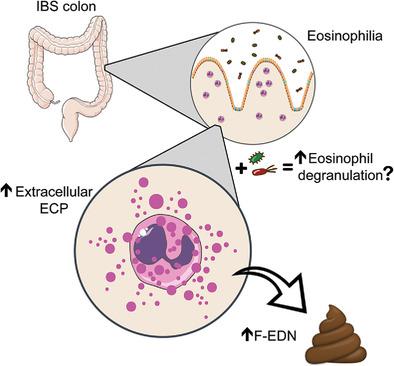当前位置:
X-MOL 学术
›
J. Leukoc. Biol.
›
论文详情
Our official English website, www.x-mol.net, welcomes your
feedback! (Note: you will need to create a separate account there.)
Elevated F-EDN correlates with mucosal eosinophil degranulation in patients with IBS—A possible association with microbiota?
Journal of Leukocyte Biology ( IF 3.6 ) Pub Date : 2021-06-21 , DOI: 10.1002/jlb.4a0521-228r Maite Casado-Bedmar 1 , Felipe Meira de-Faria 1 , Olga Biskou 1 , Carl Mårten Lindqvist 2 , Purnika Damindi Ranasinghe 3 , Olga Bednarska 1, 4 , Christer Peterson 5 , Susanna A Walter 1, 4 , Marie Carlson 6 , Åsa V Keita 1
Journal of Leukocyte Biology ( IF 3.6 ) Pub Date : 2021-06-21 , DOI: 10.1002/jlb.4a0521-228r Maite Casado-Bedmar 1 , Felipe Meira de-Faria 1 , Olga Biskou 1 , Carl Mårten Lindqvist 2 , Purnika Damindi Ranasinghe 3 , Olga Bednarska 1, 4 , Christer Peterson 5 , Susanna A Walter 1, 4 , Marie Carlson 6 , Åsa V Keita 1
Affiliation

|
Eosinophils have been linked to functional dyspepsia; however, less is known about their role in irritable bowel syndrome (IBS). This study tested the hypothesis of alterations in levels of fecal eosinophil-derived neurotoxin (F-EDN) and eosinophil density and degranulation within the colonic mucosa of IBS patients compared with healthy controls (HC). Colonic biopsies were collected from 37 IBS patients and 20 HC and analyzed for eosinophil numbers and local degranulation of eosinophil cationic protein (ECP) by histologic procedures. Fecal samples were collected for F-EDN and microbiota analysis. Differentiated 15HL-60 cells were used in vitro to investigate the direct effect of live bacteria on eosinophil activation measured by a colorimetric assay with o-phenylenediamine (OPD) substrate. We observed a higher number of eosinophils and increased extracellular ECP in the mucosa of IBS patients compared with HC. Moreover, F-EDN levels in IBS samples were elevated compared with HC and positively correlated to extracellular ECP. Metagenomic analysis showed significant correlations between bacterial composition and eosinophil measurements in both HC and IBS patients. In vitro experiments revealed an increased degranulation of 15HL-60 after stimulation with Salmonella typhimurium, Salmonella enterica, and Yersinia enterocolitica. To conclude, we could demonstrate alterations related to eosinophils in IBS, and, for the first time, a positive correlation between F-EDN levels and degranulated eosinophils in the colonic mucosa of IBS patients. Together our results suggest that eosinophils play a role in the pathophysiology of IBS and the mechanisms might be linked to an altered microbiota.
中文翻译:

F-EDN 升高与 IBS 患者黏膜嗜酸性粒细胞脱粒相关——可能与微生物群有关?
嗜酸性粒细胞与功能性消化不良有关;然而,人们对它们在肠易激综合征 (IBS) 中的作用知之甚少。本研究验证了与健康对照组 (HC) 相比,IBS 患者结肠粘膜内粪便嗜酸性粒细胞衍生神经毒素 (F-EDN) 和嗜酸性粒细胞密度和脱粒水平改变的假设。从 37 名 IBS 患者和 20 名 HC 收集结肠活检,并通过组织学程序分析嗜酸性粒细胞数量和嗜酸性粒细胞阳离子蛋白 (ECP) 的局部脱粒。收集粪便样本用于 F-EDN 和微生物群分析。在体外使用分化的 15HL-60 细胞来研究活细菌对嗜酸性粒细胞活化的直接影响,该作用是通过使用邻苯二胺 (OPD) 底物的比色测定法测量的。与 HC 相比,我们观察到 IBS 患者黏膜中嗜酸性粒细胞数量增加和细胞外 ECP 增加。此外,与 HC 相比,IBS 样本中的 F-EDN 水平升高,并且与细胞外 ECP 呈正相关。宏基因组分析显示 HC 和 IBS 患者的细菌组成和嗜酸性粒细胞测量值之间存在显着相关性。体外实验表明,用 15HL-60 刺激后脱粒增加鼠伤寒沙门氏菌、肠道沙门氏菌和小肠结肠炎耶尔森氏菌。总之,我们可以证明 IBS 中与嗜酸性粒细胞相关的改变,并且首次证明 F-EDN 水平与 IBS 患者结肠黏膜中脱粒嗜酸性粒细胞之间呈正相关。总之,我们的结果表明嗜酸性粒细胞在 IBS 的病理生理学中发挥作用,其机制可能与改变的微生物群有关。
更新日期:2021-06-21
中文翻译:

F-EDN 升高与 IBS 患者黏膜嗜酸性粒细胞脱粒相关——可能与微生物群有关?
嗜酸性粒细胞与功能性消化不良有关;然而,人们对它们在肠易激综合征 (IBS) 中的作用知之甚少。本研究验证了与健康对照组 (HC) 相比,IBS 患者结肠粘膜内粪便嗜酸性粒细胞衍生神经毒素 (F-EDN) 和嗜酸性粒细胞密度和脱粒水平改变的假设。从 37 名 IBS 患者和 20 名 HC 收集结肠活检,并通过组织学程序分析嗜酸性粒细胞数量和嗜酸性粒细胞阳离子蛋白 (ECP) 的局部脱粒。收集粪便样本用于 F-EDN 和微生物群分析。在体外使用分化的 15HL-60 细胞来研究活细菌对嗜酸性粒细胞活化的直接影响,该作用是通过使用邻苯二胺 (OPD) 底物的比色测定法测量的。与 HC 相比,我们观察到 IBS 患者黏膜中嗜酸性粒细胞数量增加和细胞外 ECP 增加。此外,与 HC 相比,IBS 样本中的 F-EDN 水平升高,并且与细胞外 ECP 呈正相关。宏基因组分析显示 HC 和 IBS 患者的细菌组成和嗜酸性粒细胞测量值之间存在显着相关性。体外实验表明,用 15HL-60 刺激后脱粒增加鼠伤寒沙门氏菌、肠道沙门氏菌和小肠结肠炎耶尔森氏菌。总之,我们可以证明 IBS 中与嗜酸性粒细胞相关的改变,并且首次证明 F-EDN 水平与 IBS 患者结肠黏膜中脱粒嗜酸性粒细胞之间呈正相关。总之,我们的结果表明嗜酸性粒细胞在 IBS 的病理生理学中发挥作用,其机制可能与改变的微生物群有关。









































 京公网安备 11010802027423号
京公网安备 11010802027423号